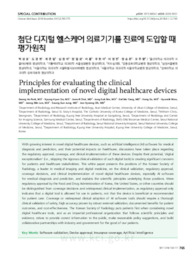

PARTNER
검증된 파트너 제휴사 자료
첨단 디지털 헬스케어 의료기기를 진료에 도입할 때 평가원칙 (Principles for evaluating the clinical implementation of novel digital healthcare devices)
11 페이지
최초등록일 2025.04.17
최종저작일
2018.12

-
미리보기
서지정보
· 발행기관 : 대한의사협회
· 수록지 정보 : 대한의사협회지 / 61권 / 12호 / 765 ~ 775페이지
· 저자명 : 박성호, 도경현, 최준일, 심정석, 양달모, 어홍, 우현식, 이정민, 정승은, 오주형
초록
With growing interest in novel digital healthcare devices, such as artificial intelligence (AI) software for medical diagnosis and prediction, and their potential impacts on healthcare, discussions have taken place regarding the regulatory approval, coverage, and clinical implementation of these devices. Despite their potential, ‘digital exceptionalism’ (i.e., skipping the rigorous clinical validation of such digital tools) is creating significant concerns for patients and healthcare stakeholders. This white paper presents the positions of the Korean Society of Radiology, a leader in medical imaging and digital medicine, on the clinical validation, regulatory approval, coverage decisions, and clinical implementation of novel digital healthcare devices, especially AI software for medical diagnosis and prediction, and explains the scientific principles underlying those positions. Mere regulatory approval by the Food and Drug Administration of Korea, the United States, or other countries should be distinguished from coverage decisions and widespread clinical implementation, as regulatory approval only indicates that a digital tool is allowed for use in patients, not that the device is beneficial or recommended for patient care. Coverage or widespread clinical adoption of AI software tools should require a thorough clinical validation of safety, high accuracy proven by robust external validation, documented benefits for patient outcomes, and cost-effectiveness. The Korean Society of Radiology puts patients first when considering novel digital healthcare tools, and as an impartial professional organization that follows scientific principles and evidence, strives to provide correct information to the public, make reasonable policy suggestions, and build collaborative partnerships with industry and government for the good of our patients.영어초록
With growing interest in novel digital healthcare devices, such as artificial intelligence (AI) software for medical diagnosis and prediction, and their potential impacts on healthcare, discussions have taken place regarding the regulatory approval, coverage, and clinical implementation of these devices. Despite their potential, ‘digital exceptionalism’ (i.e., skipping the rigorous clinical validation of such digital tools) is creating significant concerns for patients and healthcare stakeholders. This white paper presents the positions of the Korean Society of Radiology, a leader in medical imaging and digital medicine, on the clinical validation, regulatory approval, coverage decisions, and clinical implementation of novel digital healthcare devices, especially AI software for medical diagnosis and prediction, and explains the scientific principles underlying those positions. Mere regulatory approval by the Food and Drug Administration of Korea, the United States, or other countries should be distinguished from coverage decisions and widespread clinical implementation, as regulatory approval only indicates that a digital tool is allowed for use in patients, not that the device is beneficial or recommended for patient care. Coverage or widespread clinical adoption of AI software tools should require a thorough clinical validation of safety, high accuracy proven by robust external validation, documented benefits for patient outcomes, and cost-effectiveness. The Korean Society of Radiology puts patients first when considering novel digital healthcare tools, and as an impartial professional organization that follows scientific principles and evidence, strives to provide correct information to the public, make reasonable policy suggestions, and build collaborative partnerships with industry and government for the good of our patients.참고자료
· 없음태그
-
자주묻는질문의 답변을 확인해 주세요

꼭 알아주세요
-
자료의 정보 및 내용의 진실성에 대하여 해피캠퍼스는 보증하지 않으며, 해당 정보 및 게시물 저작권과 기타 법적 책임은 자료 등록자에게 있습니다.
자료 및 게시물 내용의 불법적 이용, 무단 전재∙배포는 금지되어 있습니다.
저작권침해, 명예훼손 등 분쟁 요소 발견 시 고객센터의 저작권침해 신고센터를 이용해 주시기 바랍니다. -
해피캠퍼스는 구매자와 판매자 모두가 만족하는 서비스가 되도록 노력하고 있으며, 아래의 4가지 자료환불 조건을 꼭 확인해주시기 바랍니다.
파일오류 중복자료 저작권 없음 설명과 실제 내용 불일치 파일의 다운로드가 제대로 되지 않거나 파일형식에 맞는 프로그램으로 정상 작동하지 않는 경우 다른 자료와 70% 이상 내용이 일치하는 경우 (중복임을 확인할 수 있는 근거 필요함) 인터넷의 다른 사이트, 연구기관, 학교, 서적 등의 자료를 도용한 경우 자료의 설명과 실제 자료의 내용이 일치하지 않는 경우
문서 초안을 생성해주는 EasyAI
